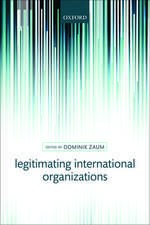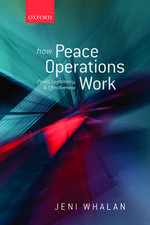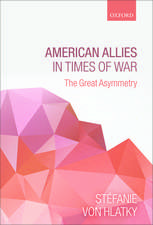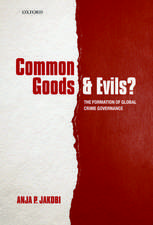Fighting Over Peace: Spoilers, Peace Agreements, and the Strategic Use of Violence: Rethinking Political Violence
Autor Andrew G. Reiteren Limba Engleză Hardback – 19 aug 2016
| Toate formatele și edițiile | Preț | Express |
|---|---|---|
| Paperback (1) | 634.49 lei 43-57 zile | |
| Springer International Publishing – 12 iun 2018 | 634.49 lei 43-57 zile | |
| Hardback (1) | 638.89 lei 43-57 zile | |
| Springer International Publishing – 19 aug 2016 | 638.89 lei 43-57 zile |
Din seria Rethinking Political Violence
-
 Preț: 392.37 lei
Preț: 392.37 lei -
 Preț: 391.61 lei
Preț: 391.61 lei -
 Preț: 386.81 lei
Preț: 386.81 lei - 15%
 Preț: 643.00 lei
Preț: 643.00 lei -
 Preț: 390.63 lei
Preț: 390.63 lei -
 Preț: 392.60 lei
Preț: 392.60 lei -
 Preț: 391.61 lei
Preț: 391.61 lei - 18%
 Preț: 735.07 lei
Preț: 735.07 lei - 15%
 Preț: 641.71 lei
Preț: 641.71 lei -
 Preț: 387.75 lei
Preț: 387.75 lei -
 Preț: 388.13 lei
Preț: 388.13 lei - 15%
 Preț: 698.15 lei
Preț: 698.15 lei -
 Preț: 384.86 lei
Preț: 384.86 lei - 18%
 Preț: 895.58 lei
Preț: 895.58 lei - 18%
 Preț: 780.19 lei
Preț: 780.19 lei - 18%
 Preț: 724.94 lei
Preț: 724.94 lei -
 Preț: 388.52 lei
Preț: 388.52 lei - 18%
 Preț: 728.11 lei
Preț: 728.11 lei - 15%
 Preț: 644.95 lei
Preț: 644.95 lei - 18%
 Preț: 781.94 lei
Preț: 781.94 lei - 15%
 Preț: 584.76 lei
Preț: 584.76 lei - 15%
 Preț: 589.65 lei
Preț: 589.65 lei - 18%
 Preț: 947.18 lei
Preț: 947.18 lei - 18%
 Preț: 725.92 lei
Preț: 725.92 lei - 18%
 Preț: 775.65 lei
Preț: 775.65 lei -
 Preț: 385.84 lei
Preț: 385.84 lei -
 Preț: 390.46 lei
Preț: 390.46 lei -
 Preț: 391.40 lei
Preț: 391.40 lei
Preț: 638.89 lei
Preț vechi: 751.64 lei
-15% Nou
Puncte Express: 958
Preț estimativ în valută:
122.29€ • 132.88$ • 102.79£
122.29€ • 132.88$ • 102.79£
Carte tipărită la comandă
Livrare economică 21 aprilie-05 mai
Preluare comenzi: 021 569.72.76
Specificații
ISBN-13: 9783319401010
ISBN-10: 3319401017
Pagini: 217
Ilustrații: XVII, 190 p. 6 illus. in color.
Dimensiuni: 148 x 210 x 18 mm
Greutate: 0.38 kg
Ediția:1st ed. 2016
Editura: Springer International Publishing
Colecția Palgrave Macmillan
Seria Rethinking Political Violence
Locul publicării:Cham, Switzerland
ISBN-10: 3319401017
Pagini: 217
Ilustrații: XVII, 190 p. 6 illus. in color.
Dimensiuni: 148 x 210 x 18 mm
Greutate: 0.38 kg
Ediția:1st ed. 2016
Editura: Springer International Publishing
Colecția Palgrave Macmillan
Seria Rethinking Political Violence
Locul publicării:Cham, Switzerland
Cuprins
1. Introduction: When Peace Begets Violence.- 2. Who Spoils and Why?.- 3. Where Spoiling Occurs.- 4. Termination Spoiling: Sabotage and Obstruction.- 5. Modification Spoiling: Bargaining and Enforcement.- 6. Conclusion: Implications for Theory and Practice.- Appendix A. Civil War Peace Agreements, 1990-2011.- Apendix B. Spoilers
Recenzii
Notă biografică
Andrew G. Reiter is Professor of Politics and International Relations at Mount Holyoke College. He is the coauthor of Transitional Justice in Balance: Comparing Processes, Weighing Efficacy (2010) as well as numerous articles and book chapters on the topics of conflict resolution, post-conflict peacebuilding, and transitional justice.
Textul de pe ultima copertă
This book presents post-peace agreement violence as a serious, yet predictable and manageable, political phenomenon. Negotiating an end to a civil war is extremely difficult, and many signed peace agreements subsequently unravel, ushering in renewed conflict. In response, important international actors have become increasingly involved in conflict mediation, peacekeeping, and post-conflict reconstruction around the globe. Policymakers and scholars alike have identified spoilers—violent actors who often rise up and attempt to challenge or derail the peace process—as one of the greatest threats to peace. Using a mixed-method approach combining quantitative and qualitative analyses of a newly created, global dataset of spoiling, Reiter demonstrates that this type of violence occurs in predictable circumstances and only represents a threat to peace under specific conditions. The book also shows that spoiling often serves to bring agreement flaws and implementation failures to light and inturn forces actors to recommit to an accord, thereby strengthening peace in the long term.
Caracteristici
Presents nuanced policy prescriptions—centred on prediction, targeted inclusion, continued negotiation, and coercion Offers third party oversight that will aid policymakers in preventing and managing spoilers Supplies an international analysis based on a large-N dataset with discussions of cases from around the globe Analyses 300 civil war peace agreements in the post-Cold War world











